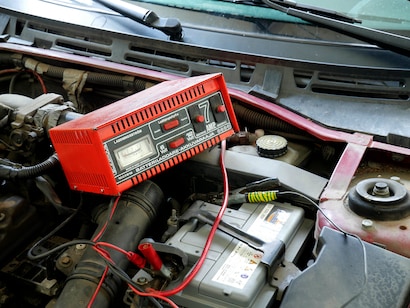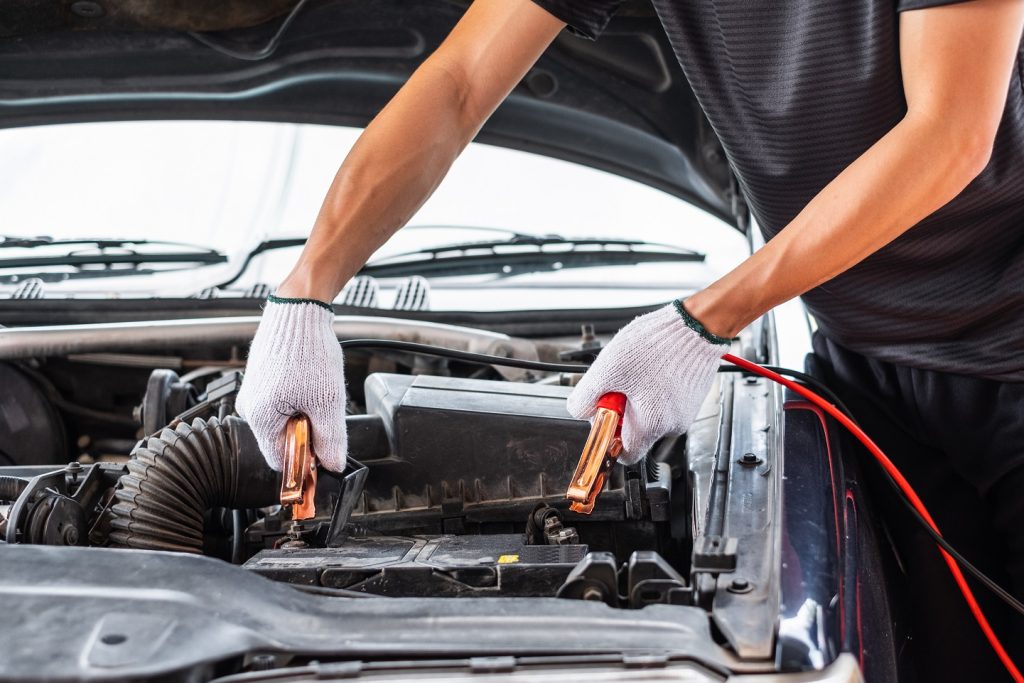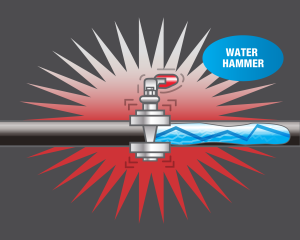Have you ever found yourself stranded because your car battery decided to give up at the worst possible moment? We’ve all been there.
You might wonder, “How long does a car battery need to charge? ” Before you reach for those jumper cables, it’s crucial to know the optimal charging time to ensure your battery’s longevity and performance. Understanding this can save you from future headaches and unexpected breakdowns.
You’ll discover not only the time it takes to charge your car battery but also smart tips on how to maximize its lifespan. Ready to turn your car battery woes into a thing of the past? Let’s dive in and unravel the mystery.
Charging Time Factors
Car battery charging time depends on several factors, including battery size and charger type. Larger batteries take longer to charge fully. Using a fast charger can reduce charging time significantly.
Charging your car battery might seem simple, but several factors influence how long it takes. Understanding these factors can help you manage your time and avoid unexpected delays. Let’s delve into the specifics of what affects charging time.
Battery Type
Different types of car batteries have varying charging needs. A standard lead-acid battery, which most cars use, generally takes longer to charge than a lithium-ion battery. If you’ve ever felt frustrated waiting for your battery to charge, consider the type you have. Lithium-ion batteries, often found in electric vehicles, charge faster and hold energy more efficiently. Knowing your battery type helps you set realistic expectations. Have you checked what type of battery powers your car?
Charger Output
The charger’s output significantly impacts the charging duration. A charger with a higher amperage will charge your battery faster than one with a lower amperage. If you’ve ever used a fast charger, you know the convenience it brings. Keep in mind that not all chargers are compatible with every battery type. Always check your charger’s specifications to ensure you’re getting the optimal charge speed. Have you ever thought about upgrading your charger for efficiency?
Current Battery State
The existing charge level of your battery is another crucial factor. A completely drained battery will naturally take longer to charge compared to one that’s only partially discharged. If you’ve been caught off guard with a dead battery, this might explain why. Regularly checking and maintaining your battery’s charge can save time. You might find that a little attention here and there prevents those unexpected waits. How often do you monitor your car’s battery level? By understanding these factors, you can better predict how long your car battery will take to charge. Next time you plug in, think about these aspects and see if they make a difference in your charging experience.

Credit: www.daze.eu
Types Of Car Batteries
Choosing the right car battery is crucial for efficient charging. There are various types of batteries available. Each type has unique features and charging requirements.
Lead-acid Batteries
Lead-acid batteries are the most common type in vehicles. They are affordable and reliable. Charging these batteries typically takes about 10 to 24 hours. The time depends on the charger and battery capacity. Slow charging is preferable to extend battery life. These batteries require regular maintenance. Check water levels and clean terminals often.
Lithium-ion Batteries
Lithium-ion batteries are newer in the automotive industry. They charge faster than lead-acid batteries. Charging can take as little as 2 hours. They are lightweight and have a longer lifespan. No need for regular maintenance. These batteries are more expensive. They are ideal for electric and hybrid cars.
Methods Of Charging
Charging your car battery is essential to keep your vehicle running smoothly. Different methods can be used depending on your needs and circumstances. Some methods are quick, while others are more gradual, but each has its own benefits. It’s important to understand these options so you can choose the right one for your car and situation.
Trickle Charging
Trickle charging is like giving your battery a gentle hug over time. It’s ideal if you’re not in a rush and want to maintain your battery’s health. Picture this: you’ve parked your car for a long vacation. A trickle charger can keep your battery topped up without overcharging. It’s a slow process, usually taking 24 to 48 hours to fully charge a depleted battery. You may ask, why so slow? Well, this method helps prevent wear and tear, extending your battery’s life. If you have the time, trickle charging is a smart choice.
Fast Charging
Need to hit the road quickly? Fast charging is your go-to option. It’s like a caffeine shot for your battery. This method can charge your battery in just a few hours. However, fast charging can generate more heat, which might affect the battery’s lifespan if done frequently. Think of it as a quick fix when you’re in a pinch. But remember, moderation is key to avoid long-term damage. If you often find yourself in a hurry, investing in a quality fast charger can be a lifesaver.
Jump Starting
Jump starting is your emergency exit when your battery suddenly dies. Imagine you’re stranded in a parking lot with a flat battery. A jump start from another vehicle can get you back on track in minutes. This method transfers energy from a functioning battery to yours, giving it enough power to start your engine. It’s not a full charge, but a temporary boost to get you moving. Have you ever wondered how prepared you are for such emergencies? Keeping jumper cables in your car can be a real game-changer.
These methods vary in speed and impact on your battery’s health. Choosing the right one depends on your immediate needs and long-term goals. Whether you’re taking a leisurely approach or need a quick fix, knowing how to charge your battery effectively can save you time and trouble.
Signs Of A Fully Charged Battery
A car battery typically takes 4 to 6 hours to fully charge. Signs of a fully charged battery include a green indicator light or a steady voltage reading. Always ensure connections are clean and secure for accurate charge status.
A fully charged car battery can be likened to a well-oiled machine, ready to power your vehicle efficiently. Knowing when your battery is fully charged is crucial to avoiding overcharging, which can lead to premature wear or damage. But how can you tell if it’s fully charged? Understanding the signs of a fully charged battery will help you maintain its longevity and ensure your car runs smoothly.
Voltage Levels
A reliable way to check if your battery is fully charged is by measuring its voltage. You might be wondering, what voltage should you look for? Most car batteries, when fully charged, will have a voltage reading between 12.6 to 12.8 volts. This can be easily checked using a multimeter, a handy tool that can save you from guesswork. Have you ever tested your battery’s voltage before a long trip? It can be a real lifesaver.
Performance Indicators
Another sign of a fully charged battery is the performance it delivers. Does your car start effortlessly, even on chilly mornings? That’s a good indicator your battery is in top shape. A sluggish start might suggest it’s time to check the charge. Additionally, bright headlights and responsive electrical systems are signs of a charged battery. It’s fascinating how the simple act of checking these indicators can prevent potential car troubles. Have you noticed how much smoother your ride feels with a fully charged battery? Ensuring your battery is charged optimally can make a big difference in your driving experience. Have you ever thought about how a simple check can help you avoid those unexpected breakdowns? It’s all about being proactive.
Safety Precautions
Charging a car battery safely involves understanding the correct time and methods. Typically, a battery needs several hours to fully charge, depending on its size and the charger used. Always ensure proper ventilation and follow manufacturer instructions to avoid hazards.
Charging a car battery might seem straightforward, but safety should always be your top priority. Whether you’re a seasoned DIY enthusiast or a first-time charger, understanding safety precautions can prevent accidents and ensure your battery charges effectively. Remember, a little care can save a lot of trouble.
Handling Batteries
When handling car batteries, always wear gloves and safety goggles. Batteries contain acid that can cause burns and irritation. It’s smart to work in a well-ventilated area to avoid inhaling any fumes. Always lift batteries using the handles or straps provided. They are heavy and awkward to carry, increasing the risk of dropping them. Secure it on a stable surface to prevent tipping over. Consider this: a friend once dropped a battery, spilling acid on his driveway. Not only was it dangerous, it also left a permanent mark on the concrete.
Charger Safety
Ensure your charger is in good condition before use. Faulty chargers can lead to overheating or short circuits. Check the cables for any signs of wear or damage. Follow the manufacturer’s instructions closely. Different chargers have different requirements. Are you using the right setting for your battery type? Avoid charging the battery in extreme temperatures. Excessive heat or cold can affect the charging process and damage the battery. Ideally, charge at room temperature for optimal performance. A thought to ponder: Have you ever considered how a small mistake with a charger might cost you a new battery or worse? It’s better to take a few minutes to check everything before starting. Stay safe, and charge smartly. With the right precautions, you can ensure your car battery remains in top condition, ready to power your journey.

Credit: www.carcitywholesale.com
Maintaining Battery Health
Maintaining your car battery’s health ensures a longer lifespan. Regular care prevents unexpected breakdowns. It also saves you money on replacements. Proper maintenance involves regular checks and avoiding overcharging. These practices keep the battery in optimal condition.
Regular Checks
Check your car battery regularly. Look for signs of wear and tear. Corrosion on terminals can affect performance. Clean any buildup with a brush and baking soda. Ensure the battery is secure in its holder. A loose battery can cause damage. Inspect cables for any fraying or damage. Replace damaged cables to maintain a strong connection.
Avoiding Overcharging
Overcharging harms your car battery. It reduces the battery’s life and efficiency. Use a reliable charger with an automatic shut-off feature. This prevents overcharging once the battery is full. Monitor the charging process if using a manual charger. Disconnect it once the battery reaches full charge. This practice keeps your battery healthy and ready to use.

Credit: www.interstatebatteries.com
Frequently Asked Questions
How Long Does It Take To Charge A Dead Car Battery?
Charging a dead car battery typically takes 4 to 24 hours, depending on the charger and battery size. Use a smart charger for optimal results. Ensure proper connections and monitor charging progress to avoid overcharging. Always follow manufacturer guidelines for safety and efficiency.
Is 20 Minutes Enough To Charge A Car Battery?
Twenty minutes may not fully charge a car battery. Charging time depends on the battery type and charger used. For quick charging, ensure the battery is in good condition and use an appropriate charger. Regular maintenance can improve charging efficiency.
Always follow manufacturer guidelines for optimal results and safety.
How Long Should I Drive My Car To Charge Its Battery?
Drive for at least 20 minutes at highway speeds to charge the car battery effectively. This helps the alternator generate enough power to recharge the battery. Regular short drives might not fully charge it. Consider a professional check if issues persist.
How Long Do I Need To Charge My Car Battery For It To Start?
Charge the car battery for 30 minutes to 1 hour. Ensure it reaches a sufficient voltage level for starting. Use a compatible charger for best results.
Conclusion
Car battery charging times vary. It depends on the charger type. Fast chargers take less time. Regular chargers need more hours. Always check your battery’s health. A weak battery may need longer charging. Ensure safe charging practices. Monitor the process closely.
Follow the manufacturer’s instructions. This helps prevent damage. A charged battery keeps your car running smoothly. Regular checks are important. Replace old batteries when necessary. It saves time and trouble. Understanding your car battery needs ensures reliability. Keep it charged and ready.
Your vehicle depends on it. Happy driving!







